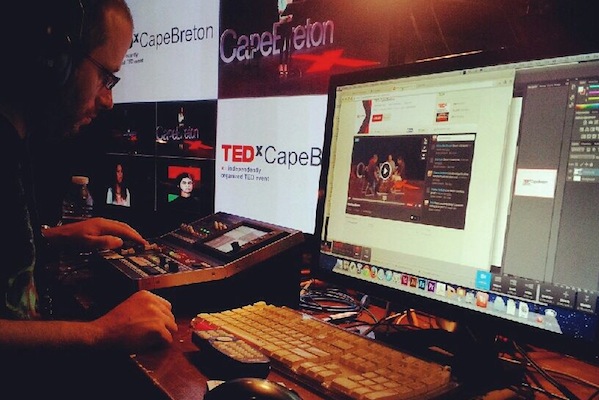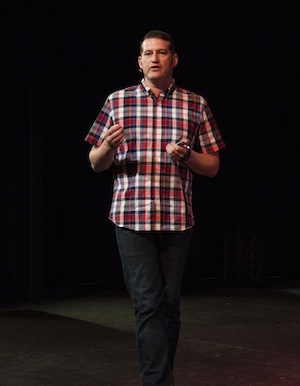
BY MARK SPARROW
Earlier this month, I tuned into the livestream of the TEDxCapeBreton event to catch some talks by Darren Gallop, Founder and CEO of Marcato Festival and Joe Menchefski, President of Billdidit Inc. to hear the thoughts of two leaders in Cape Breton’s tech sector who have founded successful companies here on the island. [CLICK HERE TO WATCH] Marcato is a software company that provides web-based management solutions to music festivals. They have clients all around the world including Coachella in the U.S., Iceland Airwaves in Iceland, and Celtic Colours International Festival here in Cape Breton. Billdidit is a company that creates innovative new drum parts and accessories which they also ship to customers around the world, and have just recently been acquired by Sabian, a global leader in drum parts.
A few days later I attended the Start-up Cape Breton event hosted by Cape Breton University that included a variety of tech-sector panelists speaking on a number of initiatives related to digital media and tech start-ups that have gotten a lot of people, including myself, fired up about the potential to grow our Cape Breton economy in this direction.
The following are some highlights from those events and some other reasons why I think we should be excited about the potential for tech start-ups:

Gallop was also a panelist at Start-up Cape Breton where he made a point about how resilient a tech-based economy can be. For example, if there were 100 tech companies like his serving niche markets around the world, with 25 employees each, and any one of those business were to fail, the sting would be felt by the investors in that company, and the 25 people who lost their job, but the rest of the community would not be devastated as it would be if a single traditional natural resources-based employer hiring 2500 people were to go belly up. With tech skills being so sought after in such an environment, there’s a good likelihood that those 25 people who just lost their job would be hired by a neighbouring company, or perhaps would take a shot at creating their own start-ups.

Gavin Uhma, founder of GoInstant, was also a panelist at Start-up Cape Breton. Uhma, while in his mid-twenties, started a software company with some friends in his basement in Cape Breton which sold in 2012, just two years after it started, to Salesforce.com for a reported $70 million.
Uhma said the low number of skilled tech employees in Cape Breton was a large reason why GoInstant had to relocate from Cape Breton to Halifax where it operates now. There are multiple computer science degree programs at universities in the Halifax area that churn out graduates looking for work in tech companies, but there are no such programs in Cape Breton.
Uhma did, however, announce during the panel that he has created, in partnership with CBU’s Shannon School of Business, a 1-year university accredited program that will be set-up in downtown Sydney where five males and five females will learn about programming, business, and to ultimately aim to launch new tech start-ups right out of the program. More on that at uitstartup.org.
This is a great effort on Uhma’s part to give back and to try to help spur the creation of new start-ups here, while also providing education on the business side of tech companies that will be valuable skills sought after by those currently in operation and needing skilled workers. However, if this program is successful and there are a number of new start-ups that come out of it, they will end up with the same challenges Gallop and Uhma have faced here already, finding enough qualified employees.
All seemed to agree, though, that just having a computer science program in your city isn’t enough either. Kids from k-12 should have opportunities to learn about computer coding both in the traditional education system and through extra-curricular Technology Camps the likes of which Rachael MacKeigan, Coordinator of the Community Access Program, has been organizing. Kids at these camps learn about computer programming, electronic engineering, and design by building robots, circuits, and 3D printing.

Tech start-ups in Cape Breton still have access to the Innovacorp I-3 program where they can apply to win cash and invaluable in-kind prizes (both Marcato and Billdidit benefitted from winning this contest in past years). Innovacorp has also launched a new SPARK program to invest prize money in tech businesses that are still in the idea/conceptual stage in an effort to draw out the good ideas people have but are sitting on.
Kim Desveaux, a business owner from New Waterford, recently announced that she is creating a business that involves a bus that will be converted into a mobile classroom travelling and teaching kids computer programming and Lego robotics. [READ THE CAPE BRETON POST STORY HERE]
John Aylward still has the two successful Venture Solutions Inc. incubators going strong in Sydport and on Prince Street and has recently told me about a new local tech start-up called Artisync which has incorporated using the co-operative business model with the aim to revolutionize the graphic novel and comic industry with web based development software.
CBU and NSCC Marconi Campus are in the process of together launching Island Sandbox, a point of collaboration where one of the streams of focus will be on Clean Technology businesses, and the other two are social enterprise and new-Canadian entrepreneurship.
There are a number of interesting tech companies that have been founded here in Cape Breton, some in operation for over a decade now, that continue to export and bring new money into our circle while creating local jobs that help to anchor some of that much needed resilience that Gallop spoke about to our economy: Protocase, Techlink Entertainment, Advanced Glazings Ltd., AG Research, Health Outcomes Worldwide, and Maritect to name a few. There are also tech start-ups like Slyce which was founded in Toronto and recently set up shop and hired 30 or so people in New Waterford.
New Dawn has been raising investment capital locally for a number of years using Community Economic Development Investment Funds (CEDIF). CEDIF’s pool money from individual investors in the community and then they invest that money into a local business while providing a tax incentive to the investor. For years, Cape Bretoners have been sending their investment dollars outside of the circle by putting their money into RRSPs and other investment options where the money pooled is used to help prop up an economy somewhere else.
While New Dawn started to use CEDIF’s to invest in their own group of companies, in recent years they’ve begun using the CEDIF’s to invest local dollars into local tech companies through the New Dawn Innovation Fund. This not only helps to stem the out-flow of capital from leaving our circle, but it puts it into companies that can bring new money into the circle.
The above is by no means a comprehensive list of all that is going on around tech companies in Cape Breton but it’s enough to show that there’s a foundation in place, some strongly rooted successful companies, a lot of new energy and activity, and a great case made for doing whatever is necessary for more of this to take place.

